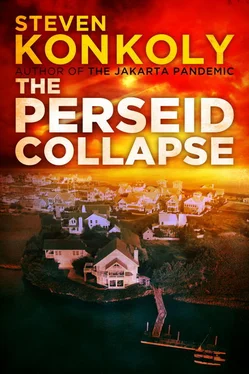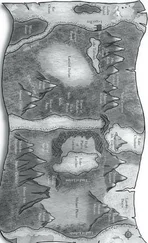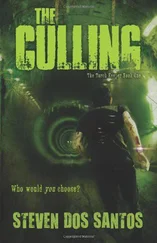“I don’t think we should stop,” Kate said.
“Trust me, you’ll be glad to stop. We did it during road marches in the Marine Corps. Marines would check their feet and drink water, while the corpsmen ran up and down the column repairing blisters and checking on guys who looked like they were about to pass out. We savored those breaks,” said Alex.
“You didn’t have a son trapped in Boston, waiting to be rescued.”
“Good point, though I have a feeling he’s not lying in bed sucking his thumb,” Alex said.
“That boy needs his mom,” Kate insisted.
“He is sort of a momma’s boy,” Alex joked. “Kids, make sure you keep sipping water! Don’t be afraid to stick that hose in your mouth.”
“That didn’t sound right,” whispered Kate.
“That was the G-rated version of what my gunny would have said.”
EVENT +05:07 Hours
South Portland, Maine
A lone car approached from behind, causing Alex to stop on the sidewalk. He stood with his family in the shadow of the three-story, red-brick middle school situated on the southeast corner of the intersection at Broadway and Ocean Street. Since turning onto Broadway, Alex had counted four cars of various makes and models. There was no discernible pattern to what type of car survived the EMP, or whatever disturbance had caused the electrical grid to fail. He had expected to see more cars based on the Critical National Infrastructure’s (CNI) revised report findings. Three cars in thirty minutes on a major road didn’t support the assertion that forty percent of all cars would remain drivable.
They all watched a gray Subaru Outback pass them and stop at the intersection, which was occupied by a functional South Portland Police Department cruiser and three police officers. The Subaru edged forward, but the officers signaled for the driver to stop the car. Alex was pretty sure that he heard them tell the driver to turn off the engine.
“Keep moving. Cut the corner and keep going down Ocean toward Highland. I’ll catch up,” said Alex.
He kept walking along the curved sidewalk and stood behind a tree, while his family moved along the front of the school in the shade cast by the tall building. Satisfied that they were leaving the scene, he turned all of his attention back to the unfolding drama. Since there was no other vehicle traffic, or any background noise for that matter, he heard the entire exchange.
“Sir, I need you to step out of the car,” said the officer by the driver’s-side window.
The second officer had taken position on the front passenger side, while the third officer circled the hatchback, examining the back seat and cargo area of the vehicle, before joining the first officer.
“Did I do something wrong?” asked the driver. “I stopped where I normally would, even though there’s no light.”
“Can you please just step out of the car? You’re not in any trouble,” said the officer.
“Well, I don’t see why I need to get out of my car. I have my license and registration right here,” said the driver, holding up the documents for the officer to see.
The officer calmly retrieved the man’s driver’s license, barely examining it before continuing.
“Mr. Reynolds, the Department of Homeland Security has declared a national state of emergency. We need to replace vehicles that were knocked out by the EMP. I’m sorry, Mr. Reynolds, but this vehicle temporarily belongs to the South Portland Police Department. Please step out of your car.”
The officer standing next to him took a few steps back and rested her hand on her service pistol. The driver saw this subtle shift and received the message, opening the door and stepping onto the pavement. He was dressed in khaki shorts with cargo pockets and a gray T-shirt. Nothing about him raised any alarms or gave Alex concern that this might end badly.
“Officer Harker will drive you home. We’re really sorry about this, but we have to get the rest of our officers out on patrol. You’re better off at your house anyway,” said the officer.
“I need to fill a prescription for my daughter at Shaw’s and try to find things—like food. I don’t suppose Officer Harker will be on loan for the next hour or so to drive me around?” asked the driver, staring down the police officer.
The police officer shook his head and held up the license, which the driver deftly snapped out of his hand. The driver kept both hands in the air, one holding the plastic license, and walked backward, shaking his head, and Alex knew there was far more to the unassuming man in shorts and a T-shirt than met the casual eye. Based on the speed and dexterity of the man’s movement, Alex had little doubt that he could have “repossessed” his car and left the three officers on the pavement in a tangle of limbs.
He had to remember this critical lesson for his own upcoming trek. Make no assumptions based on appearance. There were plenty of people out there who were quicker, stronger and craftier than he was.
“I’ll walk from here,” the man said and turned to head north on Ocean Street toward the supermarket.
He stopped several steps into his journey and turned to address the officers, who had already begun to set up for the next car that might amble into their trap.
“Hey! We forgot to fill out the paperwork! What, no paperwork? Imagine that. Enjoy the car, assholes!” he said and jogged away.
Alex slipped away from the tree and located Kate sitting in the shade of the furthest entrance stoop from the intersection. He headed in their direction, nervously looking over his shoulder. The police seemed cordial enough, but they didn’t hesitate to take away a citizen’s property in the name of emergency powers. They would have to be cautious around law enforcement. Within a few hours of the event, whatever it turned out to be, law enforcement agencies had started confiscating cars and disarming citizens.
Given the circumstances, neither of these actions qualified as a sudden decline into a “police state,” but Alex couldn’t shake distant thoughts about some of the theories popularized by Internet conspiracy pundits. “False flag” came to mind, but based on what he’d witnessed since the initial flash beyond Jewell Island, he quickly dismissed the idea as paranoia.
To conspiracy theorists, the term “false flag” implied an attack or hostile operation conducted by the U.S. government and subsequently blamed on a foreign or domestic enemy. The most common purpose cited for a false flag attack was the erosion or outright suspension of civil liberties. Conspiracy groups insisted that the United States had been repeatedly subjected to these attacks by the government over the course of three decades to soften the people’s tolerance of government intrusion.
Many of them believe that the 9/11 attacks were supported or “allowed to happen” by factions in the government looking to expand surveillance and detention powers, in the name of the “War on Terror.” Similarly, the pundits surmised that the Boston Bombing was perpetrated to test the citizens’ reaction to a martial-law-style lockdown of a major city. Would Boston’s population openly tolerate the presence of armored personnel carriers and heavily armed soldiers patrolling the streets, while teams of SWAT officers went door to door, pulling citizens out of their homes at gunpoint?
Even the Jakarta Pandemic had been linked to a “mystery faction’s” overall effort to condition the American people, desensitizing the population to situations that might result in mass casualties and essential services shortages. They claimed that all of these events would be linked to a singular, “mass event” that would tip the scales and invoke a permanent national police state, which we would welcome with open arms.
Читать дальше












